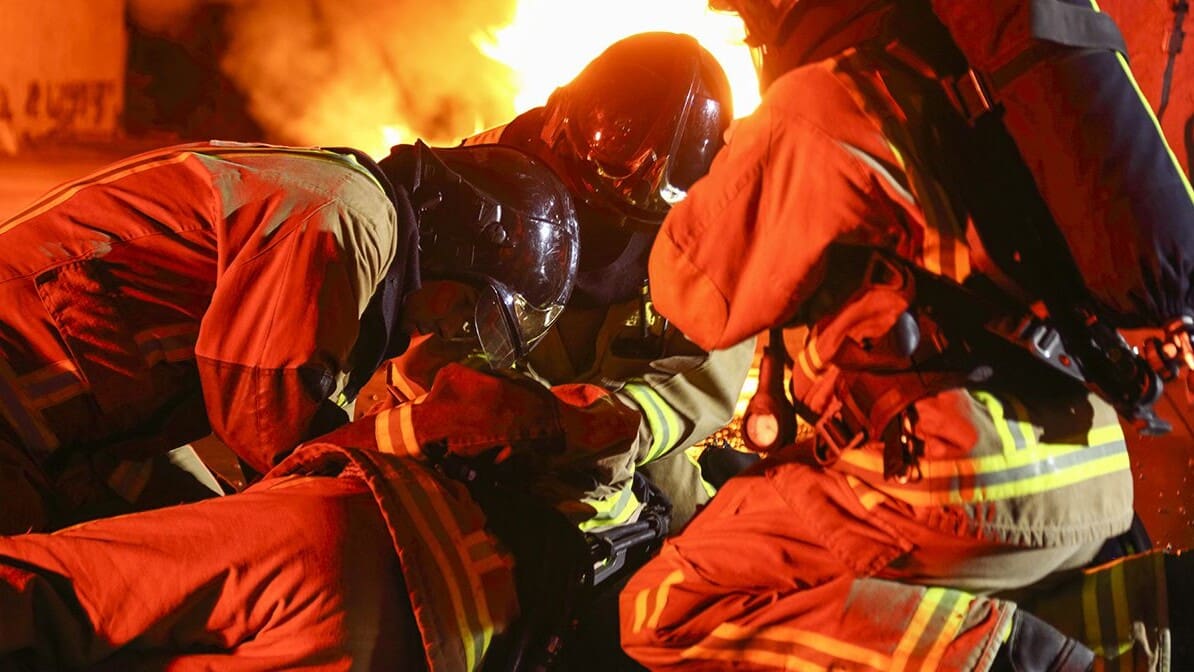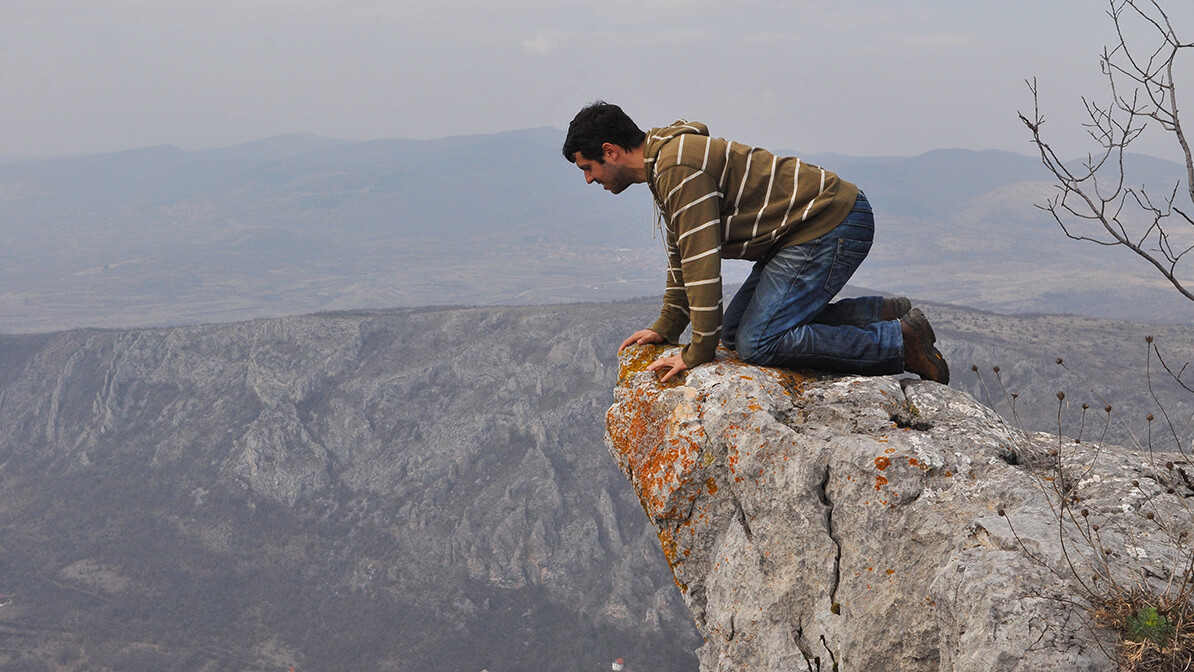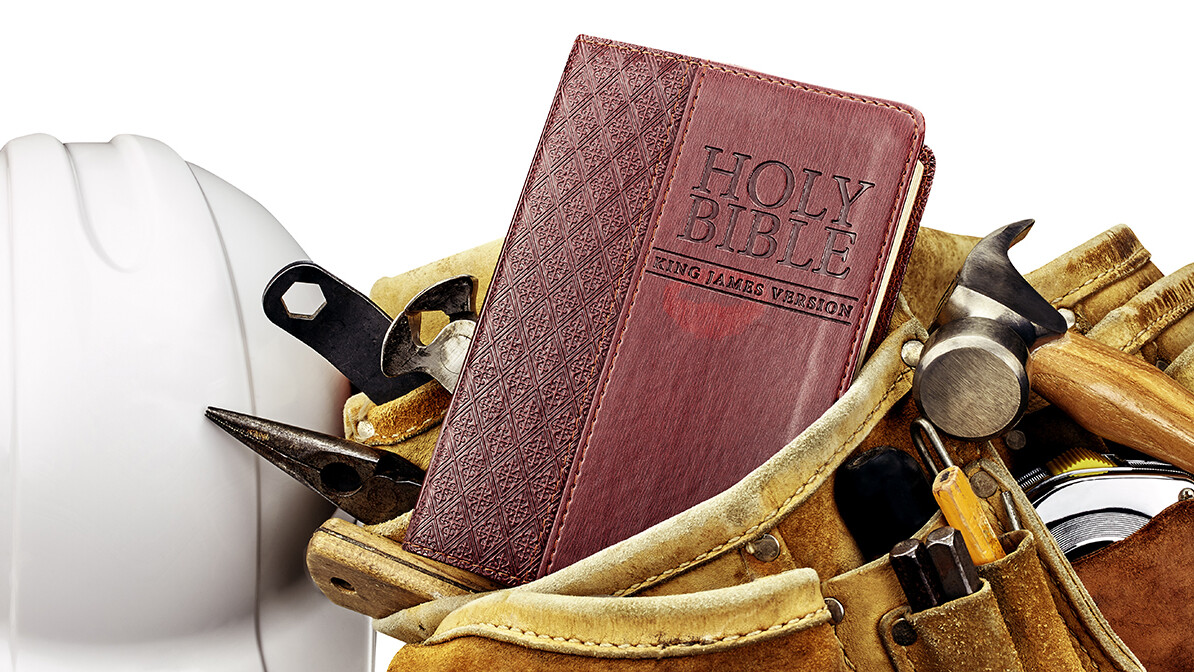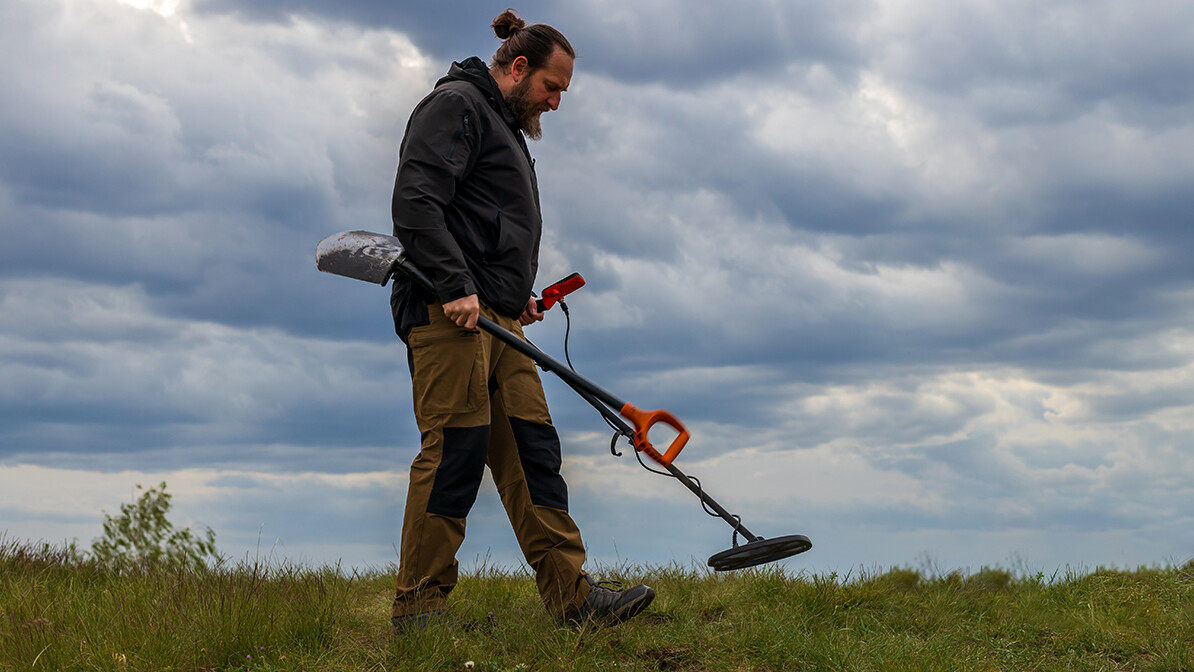- Home
- Spiritual Life
- Jason Sautel: Finding Faith in the Fire (Part 2)

Jason Sautel: Finding Faith in the Fire (Part 2)
John Farrell: How long did this whole scenario last? Can you go into how long you were in the fire and what was your rescue like?
Jason Sautel: To give you an insight into firefighting, it’s being in a pitch-black environment. At the ceiling level, it’s 1200 degrees. At the level where we fight fire, more times than not, it’s anywhere from 300 to 500 degrees. If your protective clothing ever pulls back, like where the glove attaches to the coat, you’ll immediately start getting blisters because it’s like being inside a hot oven. The higher the heat gets, the worse that goes.
When I was in there, I looked back and I remember my pants were on fire, but I didn’t feel that insane heat like I was cooking in the oven. I didn’t realize that what I had done was climb through those chemicals and my pants were burning. And yes, it started to get hot.
To me it felt like 30 minutes, but it’s like whenever you’re getting stitches or you’re at the dentist and it feels like you’ve been there for an hour, but it was maybe only a couple of minutes. I would say I was in there for maybe about two to three minutes until they came and got me. The conditions were worsening because the flames were getting hotter, and it was getting darker in there.
I had blisters all up and down my legs from the heat, but my upper body was okay. I had some burns behind my ears too because my ears were exposed. There were some pretty good blisters on my legs and ears from the three minutes I was in there.
The whole time I was trying to find a pocket of air where I could lay, be safe, and control my breathing because the number one thing you’re taught as a firefighter is we have that bottle on our back, and it only has about 20 minutes of air even though it says a half hour. With the amount of work we’re doing, we suck down the air pretty fast. So, I was controlling my breathing. Trying to stay within everything I’ve been taught, but it felt like an eternity in there, honestly. Especially with the fear that I was feeling inside. Like I said, it wasn’t a true fear of burning to death. Looking back on it now, it was a true fear of “This is going to end bad for my eternity.”
Sometimes I describe it to people that it’s like when you get the flu and you feel like you’re dying and it’s never going to go away. Then a few days later you forget about it. It was only a couple of days of your life. At that time it was horrible. When you think you’re going to die and, let’s keep it real, that you’re going to burn to death, that’s not a pleasant feeling to have either.
JF: You mentioned previously that you were “converted in the flames.” Can you talk a little more about what you meant by that?
Jason: When I truly heard the gospel message, honestly, it kind of offended me. It was told to me in a loving way, but it was like people were telling me my whole life, “Jason, you’re good. Do good things. Be a good person.” Well, guess what? I was. I was going into fires; I was rescuing people; I was putting my life on the line, and I was doing good things. But when I heard the gospel messages, they’re like, “Well, check this out. You’re doing good things for you and Jason. Where does goodness really come from?”
Once I heard the gospel message, I realized goodness only comes from above and I want to give honor and glory to God by using the gifts He gave me to help and do stuff for people and care for them. So basically, the same thing I was doing all along, but I was being told I wasn’t good because I never understood where goodness came from. If that makes sense. I thought, “Okay, but I don’t like that” because it didn’t make a lot of sense. But after I came out of the fire, looking back, it’s like, “I almost died. This is horrible.” Everything started to make sense.
All the incidents that I’ve been to as a firefighter, up until that point, I would look at and I would see a Bible involved and someone gave me grace, even though I didn’t know what grace was – like a little lady hugging me and saying, “Child, it’s going to be okay” when her husband of 70 years passed away. Or when I was in a firehouse and I darn near cursed the pastor out because I was so angry inside. But instead of him blaming me for the argument or for yelling at him, he took responsibility and said, “I’m sorry, I should not have approached you like that.”
I started thinking of these messages of grace. Then I started thinking of all these people I saw die alone and faithless and the fear in their eyes. Then I started thinking about the gospel message and it was as if something or someone else was speaking into me after that fire. All of this stuff that I called “book of lies” and “a fake Jesus,” because I was such an angry, sad man and child growing up, it just clicked in me. It was almost like being “baptized by fire” because what I experienced here, in the flesh, made me realize there’s something more.
Obviously, I don’t know if the horse was before the cart and all this stuff, but the Holy Spirit came around and gave me truth. Whether the Holy Spirit was speaking to me before I became a Christian or after I became a Christian, I got full understanding. That’s where the quote “baptism by fire” and “coming into faith under that fire” took place.
The Jumper on the Bridge and the Emptiness in His Eyes
JF: You start the book off with a powerful chapter in which you talk about the jumper on the bridge. What impact did that have on your life, especially having previously had suicidal thoughts yourself and how did it help steer you down the path you’re on now?
Jason: That moment was a moment of recognition. I’ve been looking back into it lately because some questions have come up about it. When you’re dealing with a suicide jumper, you just want to make a true connection, not a fake connection because we can all see fakeness.
I was talking, but I could see an emptiness in his eyes. It wasn’t like I was truly staring at the devil, or I could see vision and evil, but I could see what emptiness and the evilness of this world can do to a person. When you look into someone’s eyes and you see nothing, it scares you. An example I’ll give – and by no means do I want you to say that this man was evil, he was a medical patient – look into someone like Charles Manson’s eyes or a stone-cold killer. You look at their eyes and they’re not there. There is some evil there.
I saw that in that guy’s eyes, and I started to think about the emptiness that I had. I could also see the emptiness. I started seeing the emptiness in me and it scared me to death because I started thinking, “Well, if I’m empty, am I going to be filled with the same evilness that’s going to make me jump off of this bridge?”
I’d been a firefighter for 10 years prior to that and as I started going to medical calls after that – all the calls that I went to, all the horrible scenes, stuff so hideous that I can’t ever talk about it because all of the evil that would disgust people – I started wondering, “What would happen if that evilness took hold of me, and it filled the emptiness inside of me?”
Praise God I never had evil intentions, but the evilness started pulling me away from happiness and started pulling me away from the comfort. I felt like I was in the dark my whole life and I felt like the man on that Bay Bridge who was going to jump. I realized that this was not a good place to be, but without any Christians in my life giving me the truth, I had nowhere to go.
JF: In that chapter you state, “I couldn’t shake the feeling that whatever evil was in that jumper was the same thing inside me. The thing that had haunted me since I was 10 years old.” What does that mean and where, when, or how did that feeling of carrying around that “closet of fear” first arise that all these years later, you might’ve seen it in the eyes of that jumper?
Jason: That’s the weird part about writing a memoir and looking back because I was a faithless man, but now as I’m writing it, I have my scriptural goggles on. I’m looking through scripture and I understand truth now. I’m looking back into my past through truth, and it almost scares me to look at it.
First off, I recognized darkness for the first time as a kid in kindergarten. But check this out, on a side note, I also now recognize as a six-year-old that God was calling me to Him when I’ve looked back into it. That’s the beauty of looking back into our past and finding the messages that God was trying to give us at that time.
I felt that darkness when I was thrown into a closet in kindergarten because I wanted my mom. I was crying and having a panic attack that I couldn’t be near her. I was disrupting class, and they threw me in a closet. When I was in that darkness, I wasn’t scared of the dark. I was scared of the emptiness and the evilness that was in there, and as a six-year-old, I couldn’t describe it.
From that moment forward, I was scared my whole life that there was something really bad in this world. But to me it was more like a haunted movie or something. I couldn’t explain it from a biblical view.
When I got on the Bay Bridge, that was the first recognition that, “Uh-oh. This darkness, this closet I’ve been carrying with me my whole life, other people have it too. And it’s going to lead to death, eternal death.”
It shook me to my core as I was writing and looking back into it, but I also wanted to write the stories of what they were at the time, if that makes sense. The recognition of what it comes down to is when you have emptiness inside you, but then you become a fireman and every scene that you go to and respond to, you pick a piece of it up, no matter what. Whether it’s a fire, you pick up some of the carbon monoxide. It tears your body down. But mentally, physically, and spiritually, it picks something up because you were there with someone trying to make their pain better when they’re at their bottom. Whether their house is burning down or they’re taking their final breaths because they’ve been shot and their eternity is going to be locked-in in front of you and you’re doing everything in your power to not let them die. Meanwhile, family members are screaming, “Save them!”
There are multiple levels of trauma that you’re trying to deal with as you’re trying to keep this person alive. “Oh man, I’m a human watching someone die. I’m a human and other humans are screaming at me to save this person who I can’t save.” That’s sticks to you. And if you don’t have a place to leave it, it starts filling you and it will weigh you down big time. That’s something that I struggled with when I was carrying that closet of darkness. It was like I was packing it full of even more darkness and evil and I had nowhere to leave it.
…
Order your copy of The Rescuer: One Firefighter’s Story of Courage, Darkness, and the Relentless Love That Saved Him by Jason Sautel
Trending Now
Sign up today for your Inspiration Today Daily Newsletter
Supercharge your faith and ignite your spirit. Find hope in God’s word. Receive your Inspiration Today newsletter now!
John Farrell
John Farrell serves as the Digital Content Manager at Inspiration Ministries, where he oversees the planning, organization, and management of website content to support the ministry's global digital outreach. With a strong background in writing and editorial strategy, John ensures that the articles, devotionals, and discipleship resources on Inspiration.org are accurate, engaging, and aligned with the ministry's mission.
John has authored more than 1,000 articles, press releases, and features for Inspiration Ministries, NASCAR, Lionel, and Speed Digital. His versatility as a writer is also showcased in his 2012 book, The Official NASCAR Trivia Book: With 1,001 Facts and Questions to Test Your Racing Knowledge.
A graduate of Appalachian State University, John brings excellence and attention to detail to the digital experience at Inspiration Ministries. He lives in Concord, N.C., with his wife and two sons.
Related Articles
March 5, 2026
Free from Fear: Why God Never Meant You to Live Afraid
Fear shows up in every life at some point—but it was never meant to rule yours. If you’re searching…
March 4, 2026
You Don’t Have to Fix Everything to Be a ‘Good’ Christian
One of the most common—and exhausting—misconceptions among Christians, especially new believers, is…
March 3, 2026
What Is the Hidden Treasure in Matthew 13?
In the parable of the hidden treasure, Jesus describes a man who discovers something so valuable…
March 2, 2026
How to Move Mountains: 3 Biblical Keys for Stronger Faith
When frustration feels like a wall you can’t break through, it’s natural to wonder what to do next.…
Next Steps To Strengthen Your Walk
Inspiration Today Newsletter
Supercharge your faith and ignite your spirit. Find hope in God’s word. Receive your Inspiration Today newsletter now!
Christian Articles
Find articles to strengthen your walk and grow your faith. We have a wide range of topics and authors for you.
Submit A Prayer Request
We are here for you. Simply click on the button below to reach us by form, email or phone. Together we will lift our hearts and voices with you in prayer.





